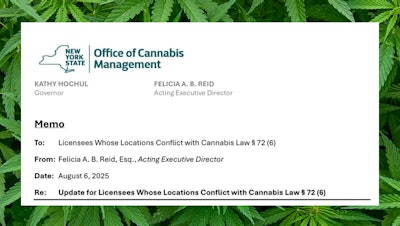
New York’s top cannabis regulator sent a letter Aug. 6 to the 108 business licensees whose locations conflict with state law, directing them not to close, move locations or alter their current operations.
Felicia A. B. Reid, the acting executive director at the Office of Cannabis Management (OCM), sent the letter as a follow-up to the office’s July 28 school proximity correction. The correction detailed how the office began misguiding the state’s Cannabis Control Board (CCB) in 2022, leading to regulators erroneously approving dispensaries that were located too close to schools.
Instead of continuing an entrance-to-entrance measurement for the 500-foot buffer zone, the OCM notified businesses last week that it would begin measuring from a dispensary entrance to the nearest property line boundary of a school’s grounds to move into compliance with New York’s cannabis law.
After engaging with impacted businesses over the past week, Reid said in the Aug. 6 letter that she wanted to reevaluate information the OCM released and provide those impacted with additional resources.
“I understand your questions, concerns and need for clarity,” she wrote, adding that an “impacted licensee” means an entity with a final license as approved by the CCB. “This includes licensees who have businesses open and licensees who are not yet open—and whose businesses are at locations in conflict with Cannabis Law § 72 (6).”
The acting executive director clarified that impacted licensees do not include entities with provisional licenses that are still a part of the application process.
The OCM notified individual businesses last week and provided a document of the 108 impacted licensees and the 44 impacted applicants. Specifically, the 44 applicants without their final licenses must secure new, compliant locations before moving forward in the application process.
While the OCM is working with Gov. Kathy Hochul’s office and the Empire State Development to provide a $15 million fund to provide each of the 44 impacted applicants with up to $250,000 in relief coverage, some industry stakeholders say that amount of money won’t cover the damage.
Curaleaf Executive Vice Chairman Joseph Lusardi called the $250,000 a “slap in the face.” While Curaleaf isn’t impacted by the OCM’s proximity correction, it operates in New York, and its wholesale partners were among those impacted.
“It takes sometimes years of blood, sweat and tears to get a location approved,” Lusardi wrote on X. “Lobbying, lawyers, community outreach, architects, etc., all cost $$$. Carrying lease payments all that time while some regulator slow plays you.”
While the 44 applicants (who only have provisional licenses) now must find new locations, Reid said the 108 impacted licensees will be receiving a separate notice updating them and providing them with additional resources.
In the meantime, the OCM is not directing licensees to:
- close their businesses;
- move their businesses;
- stop working toward opening if they are not yet open;
- alter their current or planned business operations; or
- otherwise cease operating.
“Finally, OCM is NOT recommending to the CCB that licensees whose locations conflict with Cannabis Law § 72 (6) have their licenses revoked or taken away,” Reid wrote. “Governor Hochul and OCM are pursuing a legislative change to … enable impacted licensees and their businesses to remain at their current locations.”
Reid said she has had conversations with “dozens” of legislators and is “heartened by their resounding support for legislative redress.”
New York state Sen. Luis R. Sepúlveda, D-Bronx, filed legislation on Aug. 4 in an attempt to amend the state law to grandfather in locations for the impacted adult-use dispensaries. Notably, there are two medical cannabis dispensaries also impacted, but Sepúlveda’s bill’s language specifically exempts “adult-use” retailers whose final licenses were approved before July 28.
Cannabis Business Times reached out to Sepúlveda, asking if the language in his bill intentionally left out the two medical cannabis dispensaries.
RELATED: New York Lawmaker Introduces Legislative Fix to Grandfather in Dispensary Locations
Regardless, it’s unclear if lawmakers will have to wait until the next regular legislative session convenes in January 2026 to consider the bill, or if Hochul will call a special session and ask legislators to take up the fix this year.
In any case, the OCM has indicated that the 108 impacted licensees can submit license renewals and remain open while the office delays reviewing those renewals until after the legislative fix.
“OCM and the governor’s office will be looking to the Legislature to address this issue as early as possible during the upcoming legislative session, before CCB makes any determination on a timely submitted and sufficient renewal application,” Reid wrote. “If, while the OCM and the governor’s office pursue legislation, an impacted licensee needs proof of the license validity / a letter of good standing for business operating purposes, they can request one from OCM at: [email protected].”
Still, some businesses fear that insurance companies and banks may shy away from servicing them amid an expired license fiasco that’s dependent upon the uncertainty surrounding a pending legislative fix.
Meanwhile, after the OCM issued the July 28 proximity correction, CBT learned that Jeffrey Jensen, a California and New York lawyer who founded the Variscite companies that sued OCM multiple times in the past, attempted to put the school measurement issue on OCM’s radar 16 months earlier.
However, an OCM spokesperson told CBT earlier this week that the office’s current leadership “was not aware of this issue until recently.”
RELATED: Lawyer Alerted New York Regulators of Noncompliant Dispensary Location in March 2024
Reid also pointed to the OCM’s previous leadership as responsible for the office’s misguidance.
“I want to reassure each of you that Governor Hochul understands the injustice to impacted businesses in how previous OCM leadership set in place a practice that did not comply with Cannabis Law,” Reid wrote. “The governor is committed to fighting for impacted cannabusinesses so that they can continue living MRTA’s economic development mission and remain a vital and vibrant part of their communities.”




























